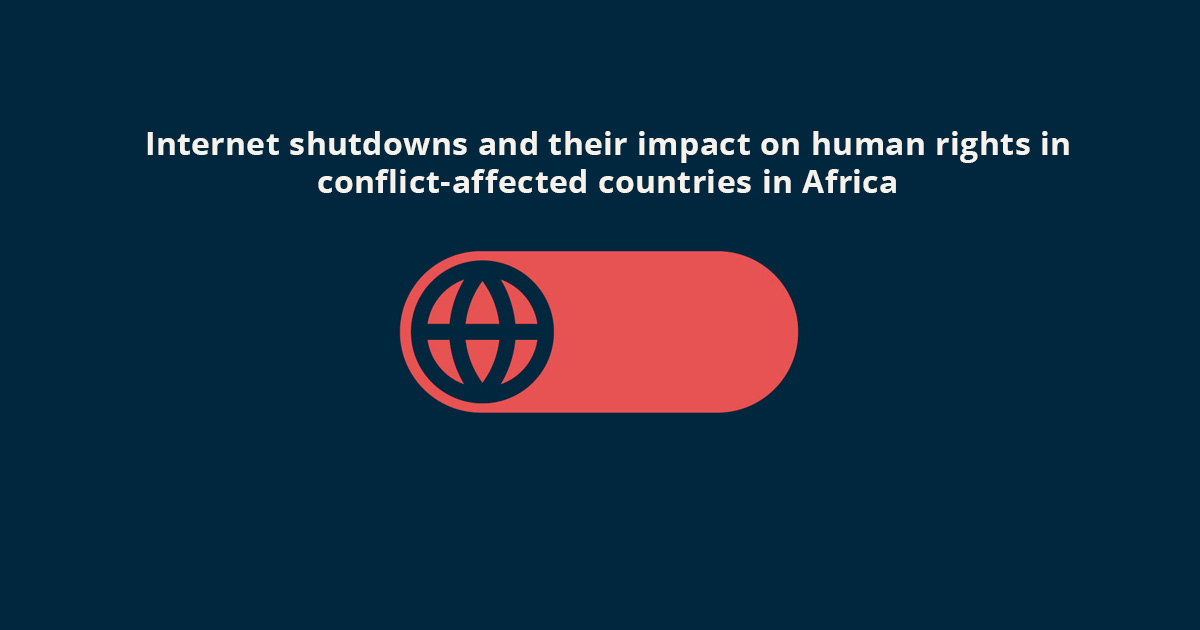On 25 March 2024, the Centre for Human Rights, Faculty of Law, University of Pretoria, in collaboration with Access Now, hosted a webinar on the impact of internet shutdowns on human rights in conflict-affected countries in Africa. The webinar explored how internet shutdowns exacerbate the impact of conflicts by preventing access to critical information, restricting humanitarian aid, concealing human rights violations, and depriving affected populations of essential services.
The webinar commenced with a keynote address by Hon. Commissioner Ourveena Geeresha Topsy-Sonoo, Special Rapporteur on Freedom of Expression and Access to Information in Africa, followed by a presentation by Felicia Anthonio, #KeepItOn Campaign Manager at Access Now, on the state of internet shutdowns on the continent, including in conflict situations. The session continued with presentations focusing on selected country contexts, highlighting the trends and impact of internet shutdowns in Ethiopia, DRC, Mozambique, and Sudan.
In her keynote remarks, Hon. Commissioner Ourveena Geeresha Topsy-Sonoo highlighted the alarming rise in internet shutdowns globally, citing a report by Access Now that recorded 296 shutdowns globally in 2024 alone, including 21 shutdowns in 15 African countries, namely Burundi, Chad, Comoros, Equatorial Guinea, Ethiopia, Guinea, Guinea-Bissau, Kenya, Mauritius, Mozambique, Nigeria, Rwanda, Senegal, Tanzania, and Uganda. She emphasized that shutdowns occur in various contexts, including political demonstrations, elections, and exams, stressing that, regardless of the justification, they are harmful, particularly given the growing reliance on the digital economy. She also referenced the Top10VPN report and noted with concern its estimate that government-induced shutdowns cost Sub-Saharan African countries $1.74 billion in 2023.
Commissioner Topsy-Sonoo particularly underscored the severe consequences of shutdowns during conflicts, using Sudan as an example. She explained that these measures prevent reporting on human rights violations, hinder accountability by enabling perpetrators to act with impunity, obstruct humanitarian efforts, disrupt online learning, and block access to digital services. She stressed that such shutdowns violate states’ obligations under Article 9 of the African Charter on Human and Peoples’ Rights, which mandates the protection of freedom of opinion, expression, and access to information both online and offline. She also referenced the African Commission’s Declaration of Principles on Freedom of Expression and Access to Information in Africa (2019), which calls on states to refrain from disrupting internet access. Despite these legal frameworks, she noted the continued proliferation of internet shutdowns in Africa.
As a response to the shutdowns, she emphasized the need for awareness initiatives such as this webinar to galvanize attention and hold states accountable. She also highlighted the Commission’s ongoing efforts to combat internet shutdowns through public condemnations, urgent appeals, and inquiries during promotion missions and reviews of state reports. However, she stressed that more action is needed and urged stakeholders to propose recommendations for addressing internet shutdowns, particularly in conflict situations. She concluded her address by commending the Centre for Human Rights and Access Now for organizing the webinar and reaffirmed her commitment to collaborating with stakeholders to combat and address the problem of internet shutdowns in Africa.
Following the keynote speech, the webinar continued with a panel discussion moderated by Hlengiwe Dube, Manager of the Expression, Information, and Digital Rights Unit at the Centre for Human Rights. The panel featured five speakers who discussed the state of internet shutdowns in conflict-affected African countries and their human rights implications. Ms. Felicia Anthonio, the first speaker, presented key highlights from Access Now’s recent report, Emboldened Offenders, Endangered Communities: Internet Shutdowns in 2024. She explained that shutdowns take various forms, including complete blackouts, throttling, and blocking specific websites or applications, and are often used to control the flow of information. She noted that 2024 recorded the highest number of shutdowns globally, with 296 incidents, adding that while triggers, such as protests and elections, were noted, conflicts were the primary cause. Felicia also highlighted the connection between shutdowns and human rights violations, citing Ethiopia and Sudan as examples where internet disruptions frequently coincide with human rights abuses. She concluded by urging states to end unjustifiable internet shutdowns and called on the African Union and other stakeholders to monitor and denounce these practices.
Following Felicia’s presentation, the webinar moved on to country-specific sessions, where human rights professionals from conflict-affected countries— Tsandzana Dércio (Mozambique), Henok Ashagrey (Ethiopia), Razan Haroun (Sudan), and Arsène Tungali (DRC) —shared insights on:
- Trends in internet shutdowns within their respective countries
- The broader human rights implications of these restrictions
- Measures needed from national and international actors, including the African Union and the African Commission, to address and combat internet shutdowns.
Overall, the webinar served as a platform for critical reflection and action, amplifying the call for more vigorous efforts to curb internet shutdowns in Africa, particularly in conflict settings. Speakers and participants stressed the need for enhanced monitoring, advocacy, and coordinated responses to hold states accountable and safeguard digital rights.
Watch the Webinar:
For more information, please contact:
Hlengiwe Dube
Manager: Expression, Information and Digital Rights Unit
Tel: +27 (0) 12 420 4197
Fax: +27 (0) 86 580 5743
hlengiwe.dube@up.ac.za
Henok Ashagrey Kremte
Project Officer: Expression, Information, and Digital Rights Unit
Centre for Human Rights, Faculty of Law, University of Pretoria
henok.kremte@up.ac.za
Felicia Anthonio
#KeepItOn Campaign Manager, Access Now
felicia@accessnow.org


